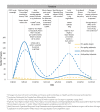Tweeting for and against public health policy: response to the Chicago Department of Public Health's electronic cigarette Twitter campaign
- PMID: 25320863
- PMCID: PMC4210950
- DOI: 10.2196/jmir.3622
Tweeting for and against public health policy: response to the Chicago Department of Public Health's electronic cigarette Twitter campaign
Abstract
Background: In January 2014, the Chicago City Council scheduled a vote on local regulation of electronic cigarettes as tobacco products. One week prior to the vote, the Chicago Department of Public Health (CDPH) released a series of messages about electronic cigarettes (e-cigarettes) through its Twitter account. Shortly after the messages, or tweets, were released, the department's Twitter account became the target of a "Twitter bomb" by Twitter users sending more than 600 tweets in one week against the proposed regulation.
Objective: The purpose of our study was to examine the messages and tweet patterns in the social media response to the CDPH e-cigarette campaign.
Methods: We collected all tweets mentioning the CDPH in the week between the e-cigarette campaign and the vote on the new local e-cigarette policy. We conducted a content analysis of the tweets, used descriptive statistics to examine characteristics of involved Twitter users, and used network visualization and descriptive statistics to identify Twitter users prominent in the conversation.
Results: Of the 683 tweets mentioning CDPH during the week, 609 (89.2%) were anti-policy. More than half of anti-policy tweets were about use of electronic cigarettes for cessation as a healthier alternative to combustible cigarettes (358/609, 58.8%). Just over one-third of anti-policy tweets asserted that the health department was lying or disseminating propaganda (224/609, 36.8%). Approximately 14% (96/683, 14.1%) of the tweets used an account or included elements consistent with "astroturfing"-a strategy employed to promote a false sense of consensus around an idea. Few Twitter users were from the Chicago area; Twitter users from Chicago were significantly more likely than expected to tweet in support of the policy.
Conclusions: Our findings may assist public health organizations to anticipate, recognize, and respond to coordinated social media campaigns.
Keywords: Twitter; e-cigarette; health departments.
Conflict of interest statement
Conflicts of Interest: None declared.
Figures


References
-
- Centers for Disease ControlPrevention (CDC) Notes from the field: electronic cigarette use among middle and high school students - United States, 2011-2012. MMWR Morb Mortal Wkly Rep. 2013 Sep 6;62(35):729–30. http://www.cdc.gov/mmwr/preview/mmwrhtml/mm6235a6.htm - PMC - PubMed
-
- Choi K, Forster J. Characteristics associated with awareness, perceptions, and use of electronic nicotine delivery systems among young US Midwestern adults. Am J Public Health. 2013 Mar;103(3):556–61. doi: 10.2105/AJPH.2012.300947. http://europepmc.org/abstract/MED/23327246 - DOI - PMC - PubMed
-
- Pearson JL, Richardson A, Niaura RS, Vallone DM, Abrams DB. e-Cigarette awareness, use, and harm perceptions in US adults. Am J Public Health. 2012 Sep;102(9):1758–66. doi: 10.2105/AJPH.2011.300526. http://europepmc.org/abstract/MED/22813087 - DOI - PMC - PubMed
-
- Wagener TL, Meier E, Hale JJ, Oliver ER, Warner ML, Driskill LM, Gillaspy SR, Siegel MB, Foster S. Pilot investigation of changes in readiness and confidence to quit smoking after E-cigarette experimentation and 1 week of use. Nicotine Tob Res. 2014 Jan;16(1):108–14. doi: 10.1093/ntr/ntt138. - DOI - PubMed
MeSH terms
Grants and funding
LinkOut - more resources
Full Text Sources
Other Literature Sources
Medical

